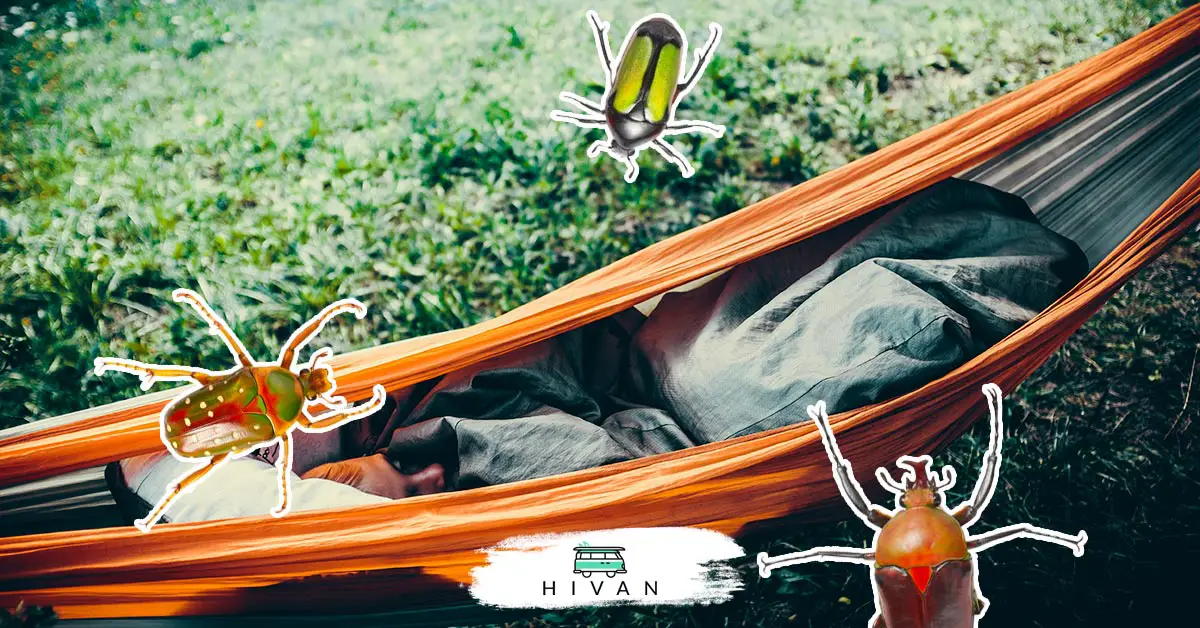Hi-van is supported by its audience. When you purchase using our links, we may earn an affiliate commission (no added cost to you). Learn more
Camping without a tent is one of the most immersive and exciting nature experiences. If you love being outdoors and want to sleep with nothing but a sleeping bag, you’re not alone. That being said, bugs and other pests can make it quite difficult to get a good night’s sleep. The good news is that we have everything you need to protect yourself and your gear.

To avoid bugs while sleeping outside without a tent, try this:
- Camp away from trees
- Use bug spray
- Store your food in airtight containers
- Make use of permethrin
- Keep a tarp under your sleeping bag
- Bring a bug net
- Don’t sleep near the water
- Light citronella candles
- Wear earplugs or beanies
Throughout this article, we’ll discuss the nine rules you should follow to avoid bugs while sleeping outside without a tent. They range from using sprays and candles to bundling with the proper padding. Good luck!
Don’t Camp Near Trees if Possible
Insects tend to build nests in and around trees. They’re filled with bees, mosquitos, and everything in between. While it’s always tempting to camp near a beautiful tree, you might end up with a face full of bug bites or swarming bees.
Instead, lay your sleeping bag in an open area with a view. This placement ensures you get the sights and sounds you’re looking for without the bug bites.
Use Bug Spray Before Going to Bed
Bug spray is a crucial part of camping, whether or not you have a tent. Spray a thin layer of it on your skin and gear to create a long-lasting barrier and prevent the insects from biting.
The Off! Bug Spray is an excellent choice because it’s well-known, trusted, and a little bit goes a long way. It comes with 25% DEET, a chemical known to repel bugs. This formula dries quickly and won’t wash off with sweat.
Whether you prefer a chemical bug spray or essential oils (citrus, lavender, and tea tree oil work great), insect repellent is irreplaceable.
Related Articles: Does Bug Spray Repel Spiders? How Much Bug Spray Should You Use at One Time?
Keep Food Stored and Sealed or Away From the Site
Urban Adventure recommends sealing all of your food in airtight coolers or hanging it in nearby trees to keep it away from the bears. While many insects live in trees, they can’t get through an airtight container.
On that note, keep your trash away from the sleeping area. Insects are much more likely to leave you alone if you don’t have food or water near you. Tighten the trash bag (if you have one) and keep it at least 20 feet away from where you intend to sleep.
Related Articles: Can a Bear Smell Food in a Yeti Cooler? Should You Keep Camp Food in Your Tent?
Spray or Rub Permethrin Throughout the Campsite
According to Rolling Fox, permethrin sprays and lotions are ideal for keeping mosquitoes and loads of other bugs away from your campsite. Regardless of if you have a tent, hammock, motorhome, or nothing but a sleeping bag, permethrin should be a go-to part of your camping setup.
Permethrin is so trusted because it can be used on fabric, skin, synthetic fibers, and many other materials. It keeps the insects away without ruining the local environment. Permethrin washes away with the rain, leaving the campsite as you found it.
Put a Tarp Under Your Sleeping Bag or Pad
Sleeping pads are the most ideal solution to prevent your body heat from leaching into the ground. However, a tarp will do if you have a high-quality sleeping bag. Placing a barrier between your sleeping bag and the ground will not only help with warmth, but it’ll also stop the insects from crawling into your sleeping bag.
Nobody wants to think about ants and other ground insects crawling all over them while they sleep. A lightweight tarp can make a huge difference! You can tie it to a tree if it starts to rain, too.
Related Article: 10 Amazing Uses for a Tarp in Van Life
Place a Bug Net Around You
Bug nets are ultra-lightweight, affordable, and easy to use. They keep every flying bug from getting into your sleeping area, so why not add one to your camping kit?
The Coghlan’s Mosquito Net is a rectangular net that hangs from rocks, trees, or anything near your campsite. It’s quite porous, so you can lay it over your sleeping bag without attaching it to anything. Either way, you’ll notice immediate relief from biting bugs.
You can also choose bivy sacks or hammocks that come with bug nets if you’re willing to choose a tent alternative. For sleeping on the ground without any coverage, a draped bug net will almost always do the trick.
Light Citronella Candles Around Your Sleeping Pad
Citronella candles are great for repelling mosquitoes, bees, wasps, and many other biting and stinging insects. Light a few candles within 10 to 15 feet of your campsite and enjoy the natural scent of citrus without a bug in sight. Make sure you place the candles on a stable surface to prevent them from tipping over.
If you don’t want to bring candles with you on your camping trip, you can use citronella spray or essential oils. Both of them have the same effect on nearby bugs.
Related Article: How Many Citronella Candles Do You Need?
Wear Earplugs to Keep the Bugs Out
Earplugs and beanies keep crawling and flying insects from getting into your ears. Most of them can be prevented with the previous suggestions, but it’s always better to be safe than sorry!
If you have a beanie, always keep it over your ears. Headphones can also work well if they cover your whole ear from top to bottom.
Camp Far From Stagnant Water Sources
Field Craft Guide recommends camping at least 200 feet away from water sources. Mosquitoes breed and lay eggs on stagnant water, black flies need running water to thrive, and many other bugs go to water sources for hydration. If you’re far from the water, you’ll almost always be far from the bugs.
Keep in mind that small puddles of water are more than enough to attract bugs. Camping at the top of a hill is a good idea because the water will drain downward, keeping it away from you.
Find this content useful 🙂 ?
Subscribe to our Newsletter and get a free Solar Electric Diagram + shopping list.


